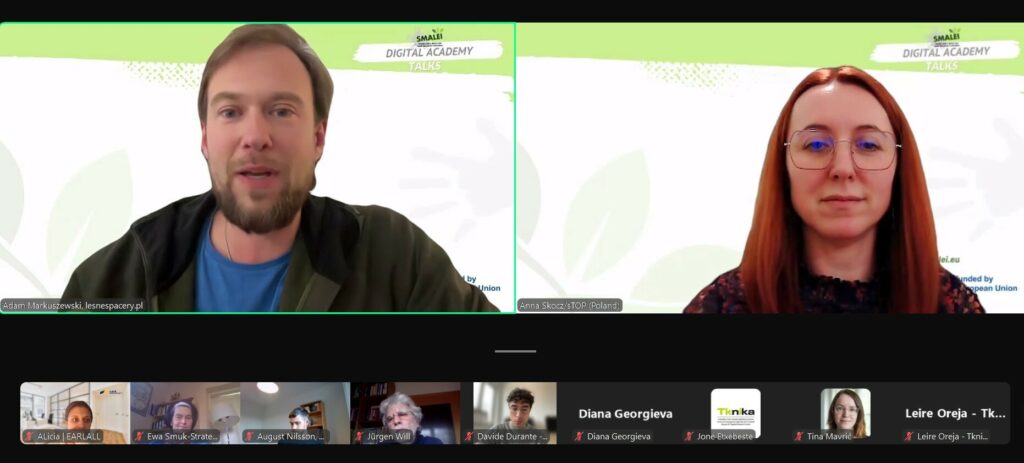SMALEI Digital Academy: Equipping Educators and Learners with Green Skills
25/11/2024

On 23 November 2024, in the context of the SMALEI EU-funded project, YUVA hosted a webinar focused on training educators and learners in green skills, exploring practical approaches to sustainability in education. Facilitated by moderator Anna Socko, from the Polish NGO Trainers’ Association (STOP), the session brought together Adam Markuszewski, from Leśne Spacery, and Ewa Smuk-Stratenwerth from Ekologiczny Uniwersytet Ludowy who shared insights from their green initiatives in Poland. Over 30 participants joined this interactive webinar to learn how hands-on, nature-focused practices can foster environmental awareness and well-being.
Exploring Green Skills and Nature Connection
The session explored how outdoor experiences and ecological education can promote sustainable mindsets. Adam Markuszewski, drawing on the Japanese concept of Shinrin-yoku (forest bathing), discussed the restorative power of nature. He emphasised how spending time in forests—engaging senses like sight, smell, and touch—can improve relaxation, problem-solving skills, and emotional connection to the environment. Markuszewski highlighted the need to expose people to diverse natural spaces beyond their usual surroundings, advocating for public transport routes to parks and community workshops that foster these experiences.
Markuszewski also referenced the “attention restoration theory,” explaining how nature engages the brain’s “soft fascination” mode, allowing learners to relax and absorb knowledge more effectively. His work aligns with creating opportunities for individuals to deepen their relationship with nature, potentially through forestry therapy programmes recognised by public institutions.Ewa Smuk-Stratenwerth introduced her eco-farm initiative in rural Poland, where she and her community have spent over 30 years teaching green skills. Through activities such as soil restoration workshops, biodiversity lessons, and farm tours, Smuk-Stratenwerth’s team engages up to 3,000 participants annually, including children and local residents. She described the importance of small, community-driven steps in promoting sustainability, noting the challenges of shifting traditional mindsets but celebrating progress in fostering ecological practices within local communities.
Questions and Practical Takeaways
Participants actively engaged in Q&A sessions, exploring topics such as incorporating outdoor activities in education. Markuszewski shared methods like guided forest walks with sensory exercises, while Smuk-Stratenwerth emphasised the transformative role of ecological storytelling and collaboration with local schools.
When asked about their vision for expanding these practices in Poland, both speakers called for broader cooperation. Markuszewski advocated for partnerships with public forests, spas, and policymakers to promote forest therapy as a recognised educational tool. Smuk-Stratenwerth shared her plans for a 10–20-year project aimed at building long-term collaborations with local communities and fostering patience in achieving ecological transformation.
The speakers addressed resistance to eco-education, noting that some individuals fear nature or are reluctant to change habits. Smuk-Stratenwerth emphasised that exposure to green practices, such as visiting eco-farms or engaging in hands-on workshops, gradually shifts mindsets. Markuszewski echoed this, encouraging small steps like spending 15 minutes in nature daily and using available resources such as training modules from global associations.
A Call to Action
Both speakers ended on a hopeful note, urging educators and organisations to embrace sustainability as a core principle rather than an optional pursuit. As Smuk-Stratenwerth put it, “Ecology is not a hobby, it’s essential.” Markuszewski added that with the right tools and incremental changes, educators can inspire transformative shifts in how people interact with the natural world.
The webinar reinforced SMALEI’s commitment to encouraging sustainable practices in adult learning, offering valuable insights for educators, trainers, and institutions to integrate green skills into their frameworks. The next webinar will take place on 5 December and will discuss how adult education institutions can develop their offers around sustainability. Fill this form to sign up for it!
To learn more about SMALEI’s initiatives, visit smalei.eu.




